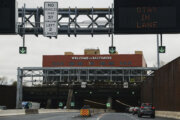DUSAN STOJANOVIC
Associated Press
NOVI SAD, Serbia (AP) — Radivoje Miljanic, the owner of “Putin Cafe,” has no dilemma over the course Serbia should take over Ukraine: turn off the pro-Western path and forge a strong alliance with Slavic ally Russia.
“Our government cannot sit on two chairs,” Miljanic said, sipping vodka in his smoky joint under a poster of Russian President Vladimir Putin, featuring Russian and Serbian flags and an onion-domed Christian Orthodox church.
Serbia finds itself caught in the middle of Moscow’s row with the West over Ukraine and is suddenly being confronted with a hard choice: continue down its path toward EU membership, or give up that dream and cozy up to Russia.
Until now, Serbia could sit on the fence. Now Moscow is issuing warnings, and so is the EU. Both are basically asking: Whose side are you on?
A cartoon recently published by Belgrade’s Danas daily sums up Serbia’s foreign policy confusion: Prime Minister Aleksandar Vucic is shown playing two pianos at the same time; German chancellor Angela Merkel is conducting on one side and Putin on the other.
Serbian officials are finding it difficult to make a clear-cut decision that could further destabilize the Balkans — the southeastern region of Europe still reeling from the bloody civil wars in the 1990s. If Serbia ditches the EU and turns to Russia, it could become an isolated island among neighbors who are either seeking EU membership, or are already part of the 28-nation bloc.
That would be economically disastrous for Serbia: Serbia exports about nine times more of its food and agricultural products to the EU than Russia. Serbian exports to Russia currently stand at a modest $170 million despite a free-trade agreement between the two countries.
Although Serbian officials say they respect Ukraine’s territorial integrity and do not support Russia’s annexation of Crimea, they are telling the West that being forced to impose EU-like sanctions against Russia would be disastrous for the country’s stagnating economy — especially since most of its energy sector is controlled by Gazprom, the Russian energy giant.
And there are historic Slavic bonds that Serbian politicians must respect in order to please voters.
“We will not turn our backs on our Russian friends who are alone and whom everybody is against right now,” said Vucic, a former pro-Russian ultra-nationalist politician recently turned pro-EU reformer.
“It is Serbia’s strategic goal to become a member of the European Union,” he said. “At the same time, Serbia did not and will not introduce sanctions against the Russian Federation.”
That stand has the support of the nationalist electorate that brought Vucic to prominence. But many analysts believe Serbia will soon be compelled to make a strategic decision on its future.
“Serbia’s maneuvering space is getting smaller as it walks a tight rope,” said political analyst Jelica Minic. “The EU’s message is clear: more pressure on Serbia to align itself with the bloc’s foreign policies.”
After the U.S. and the EU slapped sanctions on Russian state banks and major industries last month over the clashes in Ukraine, Russia responded with a wide-ranging embargo on food products imported from those countries.
Serbia is hoping to capitalize on Russia’s ban by increasing its food exports and replacing some Western goods on the Russian market. But the EU has warned Serbia to refrain from “exploiting” the Russian ban by increasing the exports with state subsidies.
Russia sees Serbia — although it was never in the Soviet bloc — as one of its last true allies in the Balkans. Moscow has threatened Belgrade that adopting the EU sanctions would mean losing preferential trade status with Russia.
Moscow is also issuing quiet threats that it could drop its endorsement in the United Nations for Serbia’s opposition to the independence of Kosovo, a onetime province that declared statehood in 2008. Putin has warned Serbia not to seek NATO membership because it is in Russia’s “sphere of interest” — a message he also directed at Ukraine before a pro-Russian insurgency took off in April.
“If Serbia was to introduce sanctions against Russia, it would be like shooting itself in the foot,” the Russian Ambassador to Belgrade, Alexander Chepurin, said in an interview with the Belgrade-based Vecernje Novosti newspaper.
“Such a decision could be adopted only by a suicidal politician because Serbia would get no benefits from such a move, only enormous damages,” he said.
In Serbia, anti-Western sentiments run high since NATO’s bombardment in 1999 over the bloody crackdown against Kosovo separatists. Dozens of Serb volunteers have joined pro-Russian rebel forces in Ukraine, despite warnings by Serbian authorities that they could be arrested and sentenced to jail when they return.
Despite the seemingly dominant pro-Russian sentiments, Serbs are deeply split over which way the country should go in the future. About 48 percent of Serbs want to join the EU, with the rest against it or undecided.
“For me, there is no dilemma: Serbia is in Europe and should be in the European Union,” said Belgrade university student Marina Jovanic, 20. “I would never live in Russia. What would I be doing there? My plan is to one day seek a job and live in western Europe or the United States.”
But the so-called “Rusofils” — the Russia supporters — are on the offensive in Serbia, where graffiti of Putin are painted on house walls and those saying “No to EU” are common.
The Russian president may have won a few admirers in the West with his warmongering policies in Ukraine, but he has many allies in Serbia.
“Putin is the only statesman in the world who strongly opposes the American and European hegemony,” said Miljanic, the cafe owner who is also a leader of the small, non-parliamentary, Russia Party in Serbia.
Copyright 2014 The Associated Press. All rights reserved. This material may not be published, broadcast, rewritten or redistributed.







